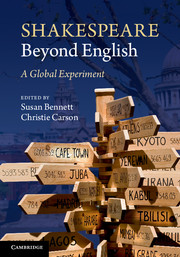Book contents
- Frontmatter
- Contents
- List of Illustrations
- List of colour plates
- Notes on contributors
- Foreword
- Acknowledgements
- Introduction
- The Globe to Globe Festival: An Introduction
- Performance Calendar
- Week One
- Week Two
- Week Three
- Chapter Seventeen Power play
- Chapter Eighteen Locating Makbet/Locating the Spectator
- Chapter Nineteen ‘Who dares receive it other’
- Chapter Twenty Two Gentlemen of Verona for/by Zimbabwean Diasporic Communities
- Chapter Twenty-One Inter-theatrical Reading
- Chapter Twenty-Two ‘This is our modern history’
- Week Four
- Week Five
- Week Six
- Afterwords
- Index
- Plate section
- References
Chapter Seventeen - Power play
Dhaka Theatre's Bangla Tempest
Published online by Cambridge University Press: 05 June 2014
- Frontmatter
- Contents
- List of Illustrations
- List of colour plates
- Notes on contributors
- Foreword
- Acknowledgements
- Introduction
- The Globe to Globe Festival: An Introduction
- Performance Calendar
- Week One
- Week Two
- Week Three
- Chapter Seventeen Power play
- Chapter Eighteen Locating Makbet/Locating the Spectator
- Chapter Nineteen ‘Who dares receive it other’
- Chapter Twenty Two Gentlemen of Verona for/by Zimbabwean Diasporic Communities
- Chapter Twenty-One Inter-theatrical Reading
- Chapter Twenty-Two ‘This is our modern history’
- Week Four
- Week Five
- Week Six
- Afterwords
- Index
- Plate section
- References
Summary
The Tempest is arguably the most protean of Shakespeare's plays, and yet what makes its openness possible is its intense focus on issues of power without dictating how they should be theatrically presented. Productions of the play over the past 400-odd years, particularly in English-speaking countries, have made it a vehicle to celebrate or to condemn colonialism, to endorse or to contest gender ideology, to display the magic of theatre or to mine the human condition via the magician Prospero, who might struggle to forgive or find it easy, be confident or inadequate in his interactions with others, revel in his supernatural powers or give them up with relief. While, for an English-speaking audience member, Dhaka Theatre's Bangla adaptation of the play, performed at Shakespeare's Globe on 7 and 8 May 2012 as part of the Globe to Globe Festival, at first glance appeared to sidestep many of the issues with which Western productions have engaged, a more nuanced understanding of its elements reveals its own sensitive approach to the issue of power, particularly in relation to questions of national identity.
National identity is clearly a crucial consideration for the company. Dhaka Theatre, established in 1973 and directed by Nasiruddin Yousuff, is:
one of the pioneers of the neo-theatre movement in [Bangladesh]. Its members believe that theatre should depict the life of the people and therefore endeavour to find a theatrical expression which will truly depict the country and its people. To achieve this goal, the group emphasises the traditional performing art forms and has tried to mingle old forms with modern ideas and technologies. The group's productions have been appreciated for their artistry as well as their portrayal of Bangladeshi themes.
- Type
- Chapter
- Information
- Shakespeare beyond EnglishA Global Experiment, pp. 141 - 149Publisher: Cambridge University PressPrint publication year: 2013

